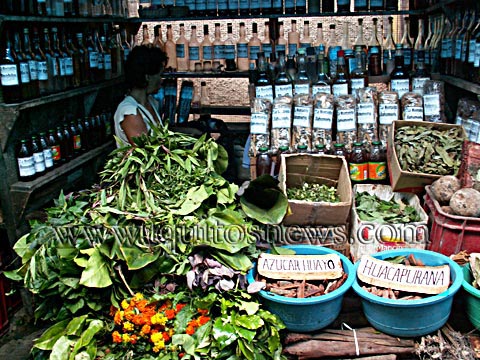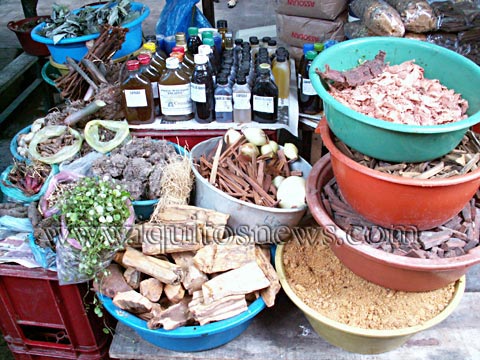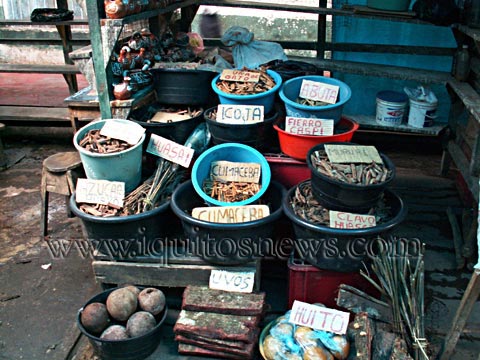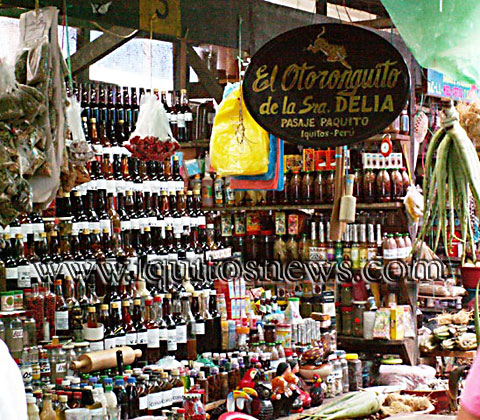severed snake head squinted at me from inside a jar of cane liquor, hardly noticeable among the shelves of home-brewed and labeled bottles of liquor and other concoctions. Carlos Ortiz sat in his stall in the
Pasaje Paquito offering snake oils, lucky charms and various natural medicines.
"You rub it on the skin to attract a woman", he said of the snakes head liquor. "Or if you want good luck at work just put the bottle in your desk drawer."
I had arrived in Pasaje Paquito following the rumor of love potions and aphrodisiacs and found them in bottles labeled
Rompe Calzon and Para, Para, whose names in translation would be something like "Panty Ripper" and "Stand Up, Stand Up."
At the foot of the passage, Miguel Pineda announced his supply of hallucinogens including the famous Ayahuasca and another, San Pedro, a cactus that reportedly induces five to six hours of visions. He was the first of several vendors who cater to the drug seeking tourist but says they are to be used to cleanse the body and to discover the spiritual world through visions.
"Many years ago the medicinal plants were discovered by the natives in their dreams," he said. "The knowledge was passed down to today’s shamans who know where to find them and how to prepare them." Also for sale are impotence cures, hair loss tonic and liquors for various illnesses.
"There is too much to learn about the plants," he said. He tries to memorize the uses of certain plants that he sells from the elderly customers who buy them, and from the natives from small jungle villages who supply his store. "But if you want to learn more, take a walk up the alley and ask any elderly lady," he suggested.
 Two stalls past the entrance to
Pasaje Paquito, Julia Grandez did not look old enough to be of assistance but insisted that she could help. Her stall was one of the first of many steeped in the aroma of cut herbs heaped in piles waist high under her tin roof. She invited me to sit while she named her liquors, oils, perfumes, herbs, (freshly cut or dried) and various seeds, fruits and candles. There were seemingly hundreds of bottles of earth-toned liquids on the shelves and mounds of cut leaves, stems and tiny yellow-flowered stalks standing upright in a plastic tub. Two stalls past the entrance to
Pasaje Paquito, Julia Grandez did not look old enough to be of assistance but insisted that she could help. Her stall was one of the first of many steeped in the aroma of cut herbs heaped in piles waist high under her tin roof. She invited me to sit while she named her liquors, oils, perfumes, herbs, (freshly cut or dried) and various seeds, fruits and candles. There were seemingly hundreds of bottles of earth-toned liquids on the shelves and mounds of cut leaves, stems and tiny yellow-flowered stalks standing upright in a plastic tub.
"Medicinal plants cure any number of illnesses", she said and listed some of the more widely known names:
Sangre de Grado for ulcers and tumors, Uña de Gato to purify the blood and strengthen the immune system and
Jergon Sacha which aids in the treatment of a list of diseases from diabetes to AIDS. Then she pulled out the aphrodisiacs -
Rompe Calzon, dubbed the Viagra of Loreto by Carlos Ortiz, is one of several mixtures of cane liquor said to improve sexual performance. They are sweet, woody tasting blends of wild honey, liquor and infusions of various herbs, roots and tree barks.
But do they work? "Oh but marvelously," Julia replied.
Blanca Rojifa, a regular customer of Julia’s’ store, ordered a bottle of boa constrictor oil. She planned to wash away the evil intentions of others with a bath of oil and grapefruit juice.
"You feel evil when some people look at you, or when they shake your hand and I deserve to be free of that. You use these things with faith," she said, mentioning her devout Catholicism. "These plants are powerful but they are just a base, useless without faith."
 Julia explained that they pack many herbs, dried and crushed, in plastic envelopes for travelers. "They are easy to slip in a pocket when crossing borders, as most countries have laws against the entrance of foreign plants or seeds," she said. Julia explained that they pack many herbs, dried and crushed, in plastic envelopes for travelers. "They are easy to slip in a pocket when crossing borders, as most countries have laws against the entrance of foreign plants or seeds," she said.
As she described the drying and pulverizing of the leaves, she looked up at the ceiling and said, "When you talk to the plants you will get to know them like friends, they have their own spirits, their own personalities."
At the end of the Street, Mariana Tasilla prepared love potions and hex-blocking tonics. She opened several small bottles and tilted one on to her wrist.
"Wear it like perfume and let the person you like see you," she said. "Then they may fall in love."
"Have you ever used it, I asked?"
"No, there are more than enough boys interested in me," she said with a laugh.
The oil of the pink dolphin is a powerful lotion of attraction, she said, but with dire effects if used improperly.
"Put it on your finger and touch the person you like to make them fall in love with you. But if you don’t know what you’re doing, it can be dangerous. You may both go insane."
 She was also immersed in a multi-earth toned world of home-labeled bottles, stacks of candles and heaps of herbs and leaves, some of whose properties she discussed.
Ayahuma, also called the "head of the dead," is a small fruit with a coconut-like shell and a brown, burnt smelling pulp that, mixed with water and rubbed on the skin, will cleanse the body of minor spells and general filth. Ajosacha is a leafy herb which will restore success to any failing business. You and your employees need only wash yourselves in a rinse prepared of the leaves two times a week for three weeks. She was also immersed in a multi-earth toned world of home-labeled bottles, stacks of candles and heaps of herbs and leaves, some of whose properties she discussed.
Ayahuma, also called the "head of the dead," is a small fruit with a coconut-like shell and a brown, burnt smelling pulp that, mixed with water and rubbed on the skin, will cleanse the body of minor spells and general filth. Ajosacha is a leafy herb which will restore success to any failing business. You and your employees need only wash yourselves in a rinse prepared of the leaves two times a week for three weeks.
While she explained the preparation of a rheumatism cure, a young man visited to buy some Kawalonga seeds. He was under the effects of a hex placed on him by a jealous rival, Mariana said, and needed the seeds to prepare a potion that expelled the curse and would place the same on his tormentor. The potion is a foul tasting brew of cane liquor, camphor, onion and two
Kawalonga seeds - the male and female. Drink two to three cups daily.
She planned to spend the next day in the kitchen boiling bark and roots in huge aluminum pots. I left her to let her serve a taxi driver wanting a warm drink to buffer him against the brisk winds and wondered if someone had placed a hex on my temperamental camera.
Passing Julia’s stand on my way out, she called, "Come back any day."
Every day you learn something new. Doubly true for a day spent in the
Pasaje Paquito.

|


 Two stalls past the entrance to
Pasaje Paquito, Julia Grandez did not look old enough to be of assistance but insisted that she could help. Her stall was one of the first of many steeped in the aroma of cut herbs heaped in piles waist high under her tin roof. She invited me to sit while she named her liquors, oils, perfumes, herbs, (freshly cut or dried) and various seeds, fruits and candles. There were seemingly hundreds of bottles of earth-toned liquids on the shelves and mounds of cut leaves, stems and tiny yellow-flowered stalks standing upright in a plastic tub.
Two stalls past the entrance to
Pasaje Paquito, Julia Grandez did not look old enough to be of assistance but insisted that she could help. Her stall was one of the first of many steeped in the aroma of cut herbs heaped in piles waist high under her tin roof. She invited me to sit while she named her liquors, oils, perfumes, herbs, (freshly cut or dried) and various seeds, fruits and candles. There were seemingly hundreds of bottles of earth-toned liquids on the shelves and mounds of cut leaves, stems and tiny yellow-flowered stalks standing upright in a plastic tub.
 Julia explained that they pack many herbs, dried and crushed, in plastic envelopes for travelers. "They are easy to slip in a pocket when crossing borders, as most countries have laws against the entrance of foreign plants or seeds," she said.
Julia explained that they pack many herbs, dried and crushed, in plastic envelopes for travelers. "They are easy to slip in a pocket when crossing borders, as most countries have laws against the entrance of foreign plants or seeds," she said.
 She was also immersed in a multi-earth toned world of home-labeled bottles, stacks of candles and heaps of herbs and leaves, some of whose properties she discussed.
Ayahuma, also called the "head of the dead," is a small fruit with a coconut-like shell and a brown, burnt smelling pulp that, mixed with water and rubbed on the skin, will cleanse the body of minor spells and general filth. Ajosacha is a leafy herb which will restore success to any failing business. You and your employees need only wash yourselves in a rinse prepared of the leaves two times a week for three weeks.
She was also immersed in a multi-earth toned world of home-labeled bottles, stacks of candles and heaps of herbs and leaves, some of whose properties she discussed.
Ayahuma, also called the "head of the dead," is a small fruit with a coconut-like shell and a brown, burnt smelling pulp that, mixed with water and rubbed on the skin, will cleanse the body of minor spells and general filth. Ajosacha is a leafy herb which will restore success to any failing business. You and your employees need only wash yourselves in a rinse prepared of the leaves two times a week for three weeks.
